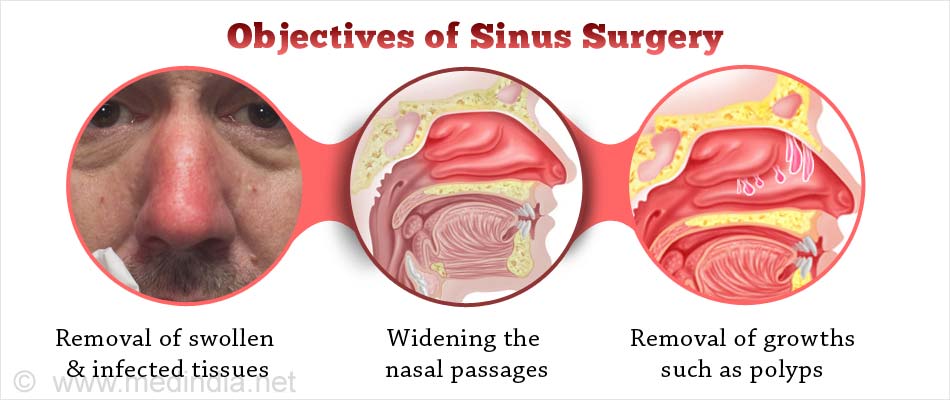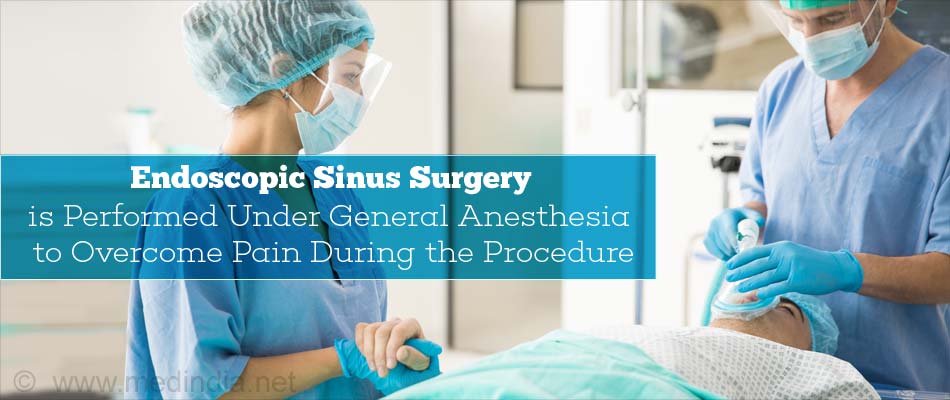What is Sinus Surgery?
Sinus surgery is a surgical procedure used to treat chronic sinusitis orchronic rhinosinusitis (many prefer this new term for the condition). It is chronic because it fails to respond to treatment with antibiotics and other medications.
The Paranasal Sinuses – Overview
The paranasal sinuses are air-filled spaces in the skull around the nasal cavity that open up into the nasal cavity. There are four paired sinuses namely, maxillary, sphenoid, frontal and ethmoid sinuses. They are named after the bone in which they are located.
The exact function of the paranasal sinuses is unclear but they are believed to humidify the inspired air and makes the skull lighter in weight. The sinuses are connected to the nasal passage by channels or tubes that permit air flow from the nose into the sinuses and allow drainage of the mucus from the sinuses into the nose to be cleared.
Chronic Sinusitis
Inflammation and infection of the paranasal sinuses over a prolonged duration is referred to as chronic sinusitis. Structural defects of the nose such as deviated nasal septum, growths such as nasal polyps, allergies as well as pollution can predispose to chronic sinusitis.
Chronic sinusitis is a common problem and many patients suffering from it are miserable with its symptoms as it is most often under-diagnosed or it can recur despite the medical treatment.
There is no one symptom for the condition to differentiate it from other conditions. Many who suffer from the condition complaint of vague symptoms such as nose getting blocked frequently or waking up in nights or headaches. The common symptoms include-
- Pain in the forehead, behind the eyes, facial pain
- Blocked and stuffy nose making breathing difficult- Chronic cough
- Post-nasal drip
- Thick mucopurulent discharge from the nose
- Sore throat
- Decreased sense of smell and/or taste
- Fatigue and tiredness
When these symptoms persist for more than three months, a diagnosis of chronic sinusitis is made and is confirmed by either an endoscopy or imaging studies such as x-ray and/or CT scan of the paranasal sinuses. If there is any doubt and endoscopy is not possible, a CT scan of the sinuses is a good diagnostic test for its confirmation.

What are the Types of Sinus Surgery?
There are two types of sinus surgery – open surgery and endoscopic sinus surgery. Nowadays, endoscopic sinus surgery (ESS), also referred to as functional endoscopic sinus surgery (FESS), has largely replaced the traditional open sinus surgery, which is associated with more pain and discomfort, and a longer recovery time. Open surgery may be done in certain cases when there is pus within the sinus cavity, infection of the facial bones or rarely when the infection has spread into the orbit of the eye or the brain resulting in brain abscess.
What are the Tests Done Before an Endoscopic Sinus Surgery?
Endoscopic sinus surgery is done by an otolaryngologist, in other words, an ear nose throat (ENT) specialist. The doctor will obtain a complete medical history and you will have to undergo a physical examination, besides tests like x-ray or CT scan of the paranasal sinuses to confirm the diagnosis. Once the surgery is finalized, you will need to undergo certain tests to confirm that you are fit for the surgery. Tests done before an endoscopic sinus surgery include the following:
- Blood tests including full blood count, liver and kidney function tests, blood glucose estimation, bleeding and clotting times, viral serology to include hepatitis B, hepatitis C and HIV, and blood group and type
- Urine tests to rule out diabetes, kidney disease or urinary infection
- Chest x-ray and electrocardiogram (ECG) to rule out lung or heart disease that may impact the type of anesthesia or choice of anesthetic agent used for the surgery
What are the Preparations Required Prior to Endoscopic Sinus Surgery?
Before the surgery, you will be advised the following:
- Medications to reduce inflammation and infection of sinuses should be taken before the surgery as advised by the doctor. Medications to reduce respiratory secretions are usually given the night before and during the surgery
- Certain medications such as aspirin, anticoagulants or NSAIDs that the patient may be taking regularly should be stopped at least 2 weeks prior to the surgery as they increase the risk of bleeding
- Smoking has to be stopped at least a month before until at least a month after the surgery as it interferes with proper healing
- You will have to get admitted to the hospital on the evening before the surgery and will not permitted to eat or drink anything after 10PM. Intravenous fluid may be occasionally required to keep you well hydrated. Sedation may be required for good overnight sleep before the surgery
What is the Procedure followed for an Endoscopic Sinus Surgery?
An hour or two before the surgery, you will be shifted to the operating room waiting area. Once the surgical room is ready, you will be shifted to the operating room.
Shift to the Operating room - The ambience in the operating room can sometimes be very daunting and a small amount of sedation can help overcome your anxiety. When you are shifted to the operating table, you will see the operating light console and at the head end will be the anesthesia machine. There may also be monitors to check oxygen levels, ECG and other vital parameters.
Anesthesia before surgery - The endoscopic sinus surgery is usually performed under general anesthesia due to which you will be asleep during the procedure. Local anesthesia with sedation is sometimes used.

During general anesthesia, the anesthetist will inject drugs through an intravenous line and make you inhale some gases through a mask that will put you in deep sleep. Once you are in deep sleep, a tube will be inserted into your mouth and windpipe to administer the anesthesia gases to overcome pain and keep you comfortable during the surgery.
What Happens During Sinus Surgery?
During endoscopic sinus surgery:
- The inner lining of the nose is infiltrated with the local anesthetic lidocaine along with epinephrine which decongests the lining
- A small thin tube illuminated at one end is introduced into the nostril to view the nasal cavity and the paranasal sinuses. Since the surgery is done through the nostrils, no external incision is required.
- With additional instruments, the affected sinuses are opened, and infected and destroyed tissues are removed. Structural abnormalities of the nose such as deviated nasal septum that divides the right and the left nostril may be corrected. A small amount of bone within the nasal cavity may be removed to widen the nasal passages and improve drainage of sinuses. A balloon may be used to widen the opening of the affected sinus, through a procedure called sinuplasty.
- A sample of the removed tissue is sent for microscopic analysis to determine, if possible, the cause of the chronic sinusitis.
- Following the surgery, the doctor will decide whether nasal packing is needed or not to control the blood loss.
What Happens After Endoscopic Sinus Surgery?
- If you have received general anesthesia during the surgery, once the surgery is over, you will wake up and the tube down the wind pipe will be removed. You will be asked to open your eyes before the tube is removed. You will be sedated and the voice of the anesthetist may be faint. Once the tube is out, you may have cough and sometimes nausea. There will also be an intravenous line. You will remain on oxygen.
- Once fully awake, you will be shifted on the trolley and taken to the recovery room adjacent to the operation theatre. Your vital signs will be monitored for a few hours and if stable, you will be shifted back to your room
- Most patients are discharged on the same day of the surgery with medications like saline nasal spray and antibiotics, and certain instructions to follow. You will be encouraged to move early to prevent the formation of blood clots in the legs (deep vein thrombosis)
- Following the surgery, slight bleeding from the nose is expected for the initial 3-5 days. Should this occur, you can gently dab the nostril with tissue without blowing the nose. Sometimes, a nasal decongestant spray may be required to stop the bleeding. If, however, the bleeding is persistent, you should seek immediate medical attention
- Pain killers such as acetaminophen or opioid analgesics may be prescribed to relieve post-operative pain and discomfort. Medications such as aspirin and NSAIDs should be avoided for a minimum of two weeks following the surgery as they increase the risk of bleeding

- Mild stuffiness and nasal congestion is normal for a few days after the surgery. Once the inflammation and swelling subsides, the congestion will be relieved
- Blowing of the nose and lifting of weights should be avoided for at least 10 days after surgery to prevent the risk of bleeding
- Normal activities can be resumed within 2 weeks of surgery
- Nasal steroid sprays should also be avoided until the doctor deems it to be safe
- Cleaning and irrigation of the nasal cavity with saline should be done as advised to remove any debris and infective material that may still remain within the nasal cavity
- You will be asked to re-visit the hospital for review of the operative area, to remove any debris and receive further instructions
What are the Complications of Sinus Surgery?
Endoscopic sinus surgery is a safe procedure and serious complications are extremely rare. However, potential complications that may occur should be borne in mind. These include the following:
- Defective sense of smell and taste which is usually temporary
- Persistence of sinus infection after the surgery
- Nasal congestion and stuffiness, usually temporary
- Nasal dryness and pain
- Voice changes –singers should especially be aware that there may be voice changes following sinus surgery
- Bleeding into the orbit of the eye
- Damage to eye muscles resulting in blurred vision or double vision; usually resolves over time
- Excessive tearing
- Damage to the eye and visual loss (extremely rare)
- Brain infection and abscess formation
- Leak of cerebrospinal fluid, the fluid around the brain
- Injury to the brain - very rare
- Post-operasstive uncontrolled bleeding

Health Tips
The following health tips may be followed to prevent chronic sinusitis
- Reduce your risk of contracting respiratory tract infections. Avoid or minimize contact with persons having respiratory infection
- Maintain good hygiene – Wash hands regularly
- Avoid exposure to pollution and cigarette smoke
- Treat allergic conditions promptly
- Use a humidifier if the ambient air is dry









